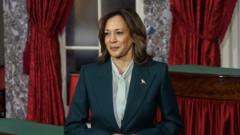In the wake of a bruising election loss to Donald Trump, Vice-President Kamala Harris is contemplating her next steps, including the possibility of a 2028 presidential run or a bid for California governor. As she prepares to certify her rival's Electoral College victory, Harris is weighing her options while reflecting on a tumultuous political journey and the need to maintain her leadership presence within the Democratic Party.
Kamala Harris Faces Crucial Choices Post-Election Loss

Kamala Harris Faces Crucial Choices Post-Election Loss
How will Vice-President Kamala Harris navigate her political future after a challenging election defeat?
Harris's aides underline that her role in the upcoming certification of the Electoral College votes, which officially validates Trump's victory, is both a constitutional duty and a moment of introspection. Although historically, losing candidates like Al Gore and Richard Nixon have performed this role, the circumstances remain challenging for Harris, who previously labeled Trump's candidacy as a threat to American democracy.
In the strategic aftermath of the election, Harris is considering her future trajectory, with 2028 potential plans stirring conversations among supporters and allies. Unlike other recent Democratic nominees who opted against further presidential bids, backers argue Harris’s brief campaign engendered considerable support which should not be overlooked. However, the question looms whether she can distinguish herself from President Biden's legacy, particularly as critics note her struggles to resonate with core Democratic voter bases.
Though some strategists see emerging Democratic governors as formidable contenders, Harris's name recognition, fundraising abilities, and volunteer network would position her advantageously should she choose to run again. Allies insist she must capitalize on her electoral experience to revive and strengthen party support leading up to the 2026 midterm elections.
However, with a world stage calling, Harris is contemplating international roles or foundation work, aiming for relevance beyond purely political ambitions. She envisions remaining engaged and visible, suggesting a desire to establish her own legacy—perhaps through a global initiative aligned with her values. As discerning choices loom large post-election, Harris's recent reflections indicate a drive to continue influencing the Democratic landscape amid evolving political dynamics.
Internally, Harris remains focused on potential avenues for activism or foundation work while simultaneously engaging with pressing global issues. Plans for international travel signal a commitment to creating a lasting impact, all while considering how to leverage her vice-presidential experience without losing sight of what comes next in an unpredictable political environment.
As she reflects on the lessons learned during a concern-filled campaign period, her call for perseverance resonates. Drawing parallels to past movements, Harris encourages steadfastness in the fight for fundamental rights and values—even under loss.
Ultimately, visions for her next chapter remain shaped by personal commitments to community and change, leaving the political world to speculate: What role will Harris carve out for herself moving forward?
In the strategic aftermath of the election, Harris is considering her future trajectory, with 2028 potential plans stirring conversations among supporters and allies. Unlike other recent Democratic nominees who opted against further presidential bids, backers argue Harris’s brief campaign engendered considerable support which should not be overlooked. However, the question looms whether she can distinguish herself from President Biden's legacy, particularly as critics note her struggles to resonate with core Democratic voter bases.
Though some strategists see emerging Democratic governors as formidable contenders, Harris's name recognition, fundraising abilities, and volunteer network would position her advantageously should she choose to run again. Allies insist she must capitalize on her electoral experience to revive and strengthen party support leading up to the 2026 midterm elections.
However, with a world stage calling, Harris is contemplating international roles or foundation work, aiming for relevance beyond purely political ambitions. She envisions remaining engaged and visible, suggesting a desire to establish her own legacy—perhaps through a global initiative aligned with her values. As discerning choices loom large post-election, Harris's recent reflections indicate a drive to continue influencing the Democratic landscape amid evolving political dynamics.
Internally, Harris remains focused on potential avenues for activism or foundation work while simultaneously engaging with pressing global issues. Plans for international travel signal a commitment to creating a lasting impact, all while considering how to leverage her vice-presidential experience without losing sight of what comes next in an unpredictable political environment.
As she reflects on the lessons learned during a concern-filled campaign period, her call for perseverance resonates. Drawing parallels to past movements, Harris encourages steadfastness in the fight for fundamental rights and values—even under loss.
Ultimately, visions for her next chapter remain shaped by personal commitments to community and change, leaving the political world to speculate: What role will Harris carve out for herself moving forward?























